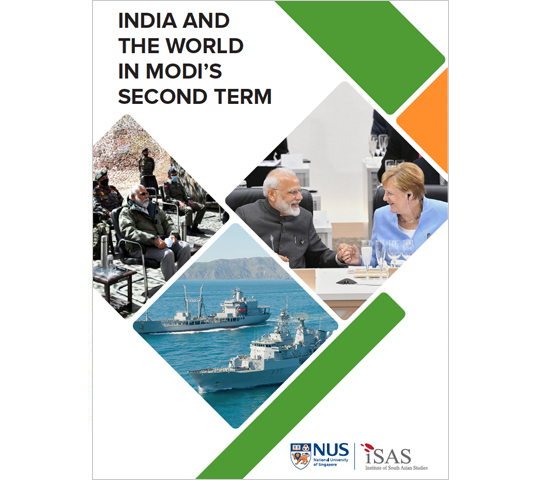
| Title: | India and the World in Modi’s Second Term |
| Author/s: | Yogesh Joshi, Nishant Rajeev, Wini Fred Gurung |
| Abstract: | The Institute of South Asian Studies held a virtual roundtable on 4 August 2020 to examine Indian Prime Minister Narendra Modi’s most significant foreign policy challenge: how to accommodate and further India’s interests in a world increasingly fraught with great power friction, the decaying legitimacy of international norms and institutions, retreating globalisation and an unstable neighbourhood.
In his first term, Modi renewed India’s engagement with different parts of the world. These engagements brought new opportunities for India to take on the mantle of a ‘leading power’. However, as these relationships continue to develop in Modi’s second term, they also present India with a new set of challenges. Some of these challenges have already begun to manifest themselves in the wake of the COVID-19 crisis. Furthermore, in Modi’s second term, India’s engagement with the different regions of the world is increasingly being shaped by China’s growing global presence. To deal with these emerging challenges, India is looking to build a larger coalition of middle powers and is falling back on themes like non-alignment. |
| Date: | 24 December 2020 |
| DOI: | 10.48561/7qq8-g2kj |
| Read More |
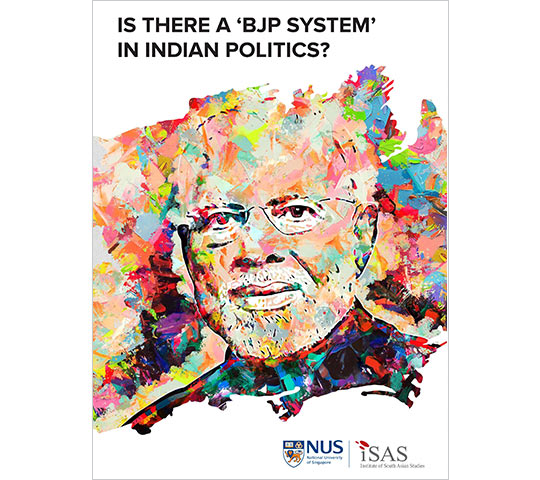
| Title: | Is There a ‘BJP System’ in Indian Politics? |
| Author/s: | Diego Maiorano, Ronojoy Sen, John Joseph Vater |
| Abstract: | The Institute of South Asian Studies (ISAS) at the National University of Singapore held a virtual roundtable on 27 May 2020 to address the issue of whether there is a ‘BJP System’ in Indian politics. Held a year after the 2019 general election, the roundtable assessed how long the BJP’s dominance will last, whether India’s current system is dominated by a single party, like that of the Congress in the 1950s and 1960s, or whether the BJP is displaying unique mechanisms and characteristics reflecting its efforts to shape India in its own mould.
This Special Report draws from the discussions to analyse characteristics of the party system, as it currently stands, to extrapolate medium-term trends. The report sets out to examine whether the ‘BJP System’ is in fact a dominant party system; how its dominance differs from that of the Congress; and to assess the system’s aims, tools and context by looking at the BJP’s electoral and cultural dominance, including its ramifications for democratic institutions. |
| Date: | 1 December 2020 |
| DOI: | 10.48561/vzzt-6v2m |
| Read More |
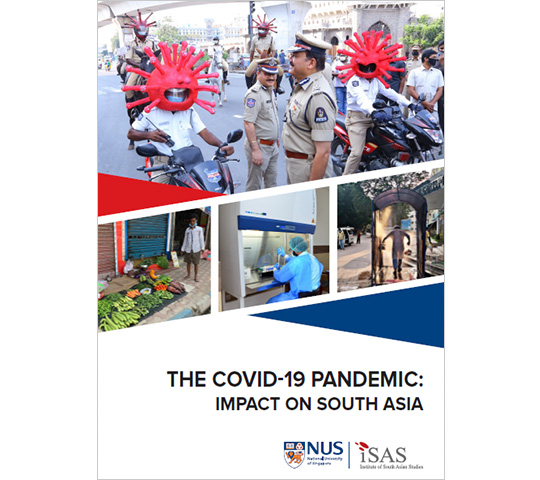
| Title: | The COVID-19 Pandemic: Impact on South Asia |
| Author/s: | Archana Atmakuri, Chulanee Attanayake, Keshav Bashyal, Iftekhar Ahmed Chowdhury, Mohammad Tarikul Islam, Muhammad Bin Khalid, Shivshankar Menon, Deeparghya Mukherjee, Karthik Nachiappan, Amitendu Palit, MMd Mustafizur Rahman , Vinod Rai, Dipinder S Randhawa, Amit Ranjan, Ronojoy Sen, Iqbal Singh Sevea, S Narayan and Bilesha Weeraratne |
| Abstract: | The COVID-19 pandemic has wreaked havoc to lives and livelihoods across the world. South Asia has been most impacted by the outbreak, which has thrown astray all strategies for socio-economic growth in the region. A recent World Bank report has indicated that regional growth will fall to between 1.8 per cent and 2.8 per cent in 2020, down from 6.3 per cent projected six months ago.
The Institute of South Asian Studies has collated papers on the COVID-19 outbreak in South Asia prepared by its researchers and invited scholars into a Special Report. It offers a comprehensive coverage of the pandemic and its impact on the South Asian countries. Among other, it discusses issues relating to the economy, migration and remittances, tourism, public health and online battles. |
| Date: | 1 October 2020 |
| DOI: | 10.48561/nsay-qsbt |
| Read More |

| Title: | COVID-19 in Singapore: Reaching out to the South Asian Community |
| Author/s: | Nithya Subramanian |
| Abstract: | The COVID-19 pandemic has affected the South Asian community in a big way, especially the migrant workers living in dormitories. This Special Report features interviews with Singapore’s Minister for Law and Minister for Home Affairs, Mr K Shanmugam and the High Commissioners of Bangladesh, India and Pakistan. It underscores the strong and proactive measures adopted by the Singapore government to contain and combat this outbreak. |
| Date: | 27 August 2020 |
| DOI: | 10.48561/ke2w-aa4k |
| Read More |
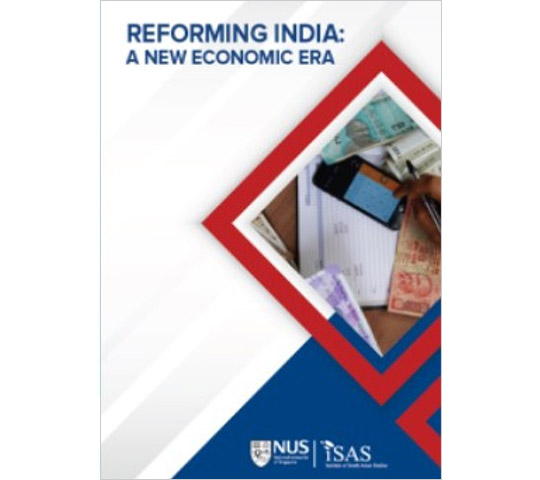
| Title: | Reforming India: A New Economic Era |
| Author/s: | Vinod Rai, S Narayan, Amitendu Palit, Ronojoy Sen, John Vater |
| Abstract: | Written by scholars at the Institute of South Asian Studies, this Special Report covers various aspects of India’s latest round of the economic reform process thus far, analysing the pros and cons of these initiatives. The papers reflect on the economic significance of the policies and their political undertones as well as the regulatory and administrative challenges that need to be overcome to make the reforms meaningful and sustainable. |
| Date: | 21 July 2020 |
| DOI: | 10.48561/n33r-mvj3 |
| Read More |

| Title: | United Nations Peace Operations: Bangladesh’s Contributions |
| Author/s: | Iftekhar Ahmed Chowdhury, Roshni Kapur and Nazneen Mohsina |
| Abstract: | On 27 August 2019, the Institute of South Asian Studies at the National University of Singapore, the Consortium of South Asian Think Tanks and the Konrad Adenauer Stiftung organised a workshop on ‘Bangladesh’s Contributions to International Security: The Case of Peace Operations’ in Singapore. The primary objective of the event was to explore Bangladesh’s efforts, motivations, strategic considerations, successes and limitations in multilateral peacekeeping missions. |
| Date: | 19 March 2020 |
| DOI: | 10.48561/cbej-kj5t |
| Read More |

| Title: | Regulating Artificial Intelligence in South Asia: Projections For The Future |
| Author/s: | Aishwarya Natarajan and Vani Swarupa Murali |
| Abstract: | Artificial Intelligence (AI) has the potential to transform the way we live, work and interact. While AI is likely to have a critical impact in key areas such as healthcare, agriculture, education, smart cities and mobility, it also raises fundamental questions about data privacy, mass surveillance and the infringement of fundamental rights. South Asia faces specific challenges in regulating AI, including the maturity of its legal systems, governance standards and economic development. It is thus important to begin a conversation about whether existing legal and regulatory frameworks in South Asia can effectively foster and regulate the deployment of AI technologies. The Institute of South Asian Studies at the National University of Singapore and the Konrad Adenauer Stiftung organised a joint roundtable on ‘Regulating Artificial Intelligence in South Asia: Projections for the Future’ on 5 August 2019. The event brought together researchers, legal and industry experts as well as policymakers to discuss key themes in the AI regulatory space. This report largely draws upon the discussions at the roundtable. It focuses on two key areas: first, the challenges posed by AI in the fields of human rights, surveillance and data strategies; and second, the imperatives of regulation and how it relates to context and literacy, as well as possible policy recommendations. |
| Date: | 11 March 2020 |
| DOI: | 10.48561/akdg-6s2x |
| Read More |
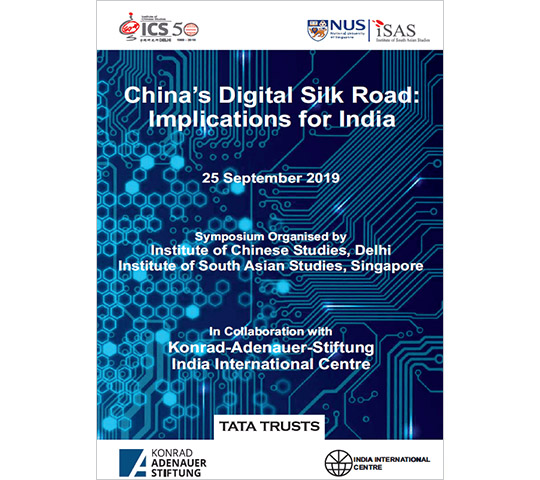
| Title: | 65: China’s Digital Silk Road: Implications for India |
| Author/s: | Ashok K Kantha, Chilamkuri Raja Mohan, Mareike Ohlberg, Dev Lewis, Chan Jia Hao, Santosh Pai, Rajesh Ghosh, Vivan Sharan, Yamini Jindal, Ananth Padmanabhan |
| Abstract: | The Institute of Chinese Studies, New Delhi, and the Institute of South Asian Studies, National University of Singapore, are delighted to present the proceedings of the symposium on China's Digital Silk Road and its implications for India. The symposium was held in New Delhi, in collaboration with the Konrad-Adenauer-Stiftung and the India International Centre on 25 September 2019. The objective of the symposium was to fill an important gap in the Indian debate on China's Belt and Road Initiative (BRI). Although the land and maritime components of Chinese President Xi Jinping's BRI have received intense scrutiny in India, the digital dimension of China's ambitious initiative has received very little attention. In an ironic twist, while, officially, India has refused to join the BRI, the Indian industry already has a significant exposure to China's digital industries. The consequences of that digital dependence on China have come into sharp view amidst the growing concerns about India's large trade deficit with China. Adding to India's challenge is the unfolding trade and technology war between the United States and China and its international consequences. |
| Date: | 31 January 2020 |
| Read More |
Load more


